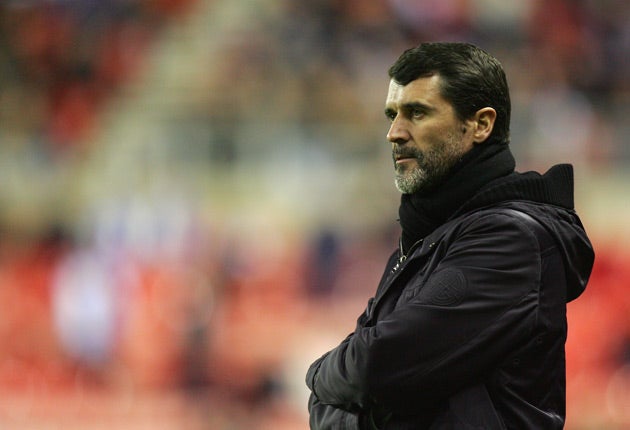James Lawton: His greatest obsession will always be himself

Almost everyone defers to Roy Keane, even the bookmakers who yesterday installed Ipswich Town as favourites to win the Championship as a reflex reaction to his appointment. It's a habit of mind, untouched apparently by his shameful exit from Sunderland when the going got tough, and is hardly surprising when you consider the meaning of all his years at Old Trafford and his initial impact at the Stadium of Light.
But sometimes you have to separate an aura, however ferociously well established the reputation that has made it, and the reality of the performance.
When you do this, Ipswich's reclusive billionaire owner, Marcus Evans, cannot be said to have invested in a sure thing.
It is the gamble that the Sunderland chairman, Niall Quinn, made when he overrode his own personally, and painfully, acquired evidence that Keane's greatest obsession will probably always be himself and his own convenience – and saw the wager collapse in a dereliction of commitment and loyalty that still leaves a bitter taste.
The indictment against Keane, however much you recognise his days as arguably the most influential player in the history of the Premier League, and his superb contribution to Ireland's cause right up the moment of ultimate betrayal in Saipan in 2002, is not easily withdrawn as he takes up his duties in the footsteps of the football knights, Alf Ramsey and Bobby Robson – men who made indelible marks on the history of the club because of their knowledge and, above all else, their understanding that a football club is about rather more than your own sense of importance and destiny.
It is about nurturing the character and the self-belief of your players. It is to do with an understanding of strengths and weaknesses and the best way of developing potential.
It rewards working closely with your players, understanding their strengths and their weakness, and proving to them that you are there for the long haul, for those disappointments and failures which inevitably come before the moments of success. It is never about quitting when things are going not quite as you hoped – or when the man who pays your wages, and gives you more or less everything you have ever asked for, demands a little time to talk over his concerns – and get a little measure, maybe, of how you are standing up to, say, a humiliating 4-1 thrashing by Bolton Wanderers.
Those of us who had few qualms about predicting a serious managerial future for Keane based our optimism on the sense of the player and the remorseless leadership and influence he exerted on the field for Manchester United, a role that even the all-seeing, all-powerful Sir Alex Ferguson was happy to celebrate.
But then along with that promise was the nag of Saipan, where Keane made the interests of the team he had helped so magnificently to reach the World Cup finals, so secondary to his own frustration about how the team was being prepared.
The trouble with the Sunderland episode is that it produced so many echoes of the one in Saipan.
It spoke of a man answerable only to his own moods and whims – and prejudices. It suggested someone who could make a virtue in his own mind of behaviour which would strike another only as outrageously impulsive and self-involved.
When Sunderland picked up the challenge of survival in the Premier League, and fought bravely to a narrow defeat at Old Trafford, Keane's temporary replacement Ricky Sbragia was at pains not to besmirch the name of his departed boss. Of course Roy Keane would emerge as a major figure in the game. Of course he had the right stuff. But Sbragia, no doubt necessarily, was less illuminating when asked to explain Keane's role, and the extent to which it had been hands-on.
The reality was evident soon enough. Keane had often been the absent squire. He had affected some of the style of his one-time mentor Brian Clough, but without the certainty of his effect. There was no insurrection, no pleadings, when Keane made the telephone call that said it was all over.
What was over, precisely? It was the time when Keane could ride with all the glory of a warrior – and a winner. A time when no player could look at Keane the manager and doubt his right to make demands on what he perceived to be the limit of available talent.
One wave of Keane's hand to a crowd yearning for success was enough to provoke thousands of dreams. But that was before the manager submitted himself to the test that has been applied to every manager football has ever known: the test of his nerve and staying power.
When he left Sunderland Keane made something of a philosophical statement, albeit one to provoke a string of questions, the most important one concerning his own motivation – and the sense of what he could do and what he couldn't.
Keane said, "Alex Ferguson comes out and says, 'You never know what he is going to do next'. What did he think I was going to do? Go backpacking around Mexico? I have five kids. Football is in my blood. I'd just had enough at Sunderland. End of bloody story."
No, of course, it wasn't the end of the story – merely an opening chapter of disquieting implications. The most serious is that Roy Keane is not a man for all seasons, only those which suit his mood of the moment. It is a luxury he cannot expect now when he comes back to deference that, as a manager, he has not begun to deserve.
Join our commenting forum
Join thought-provoking conversations, follow other Independent readers and see their replies
Comments
Bookmark popover
Removed from bookmarks